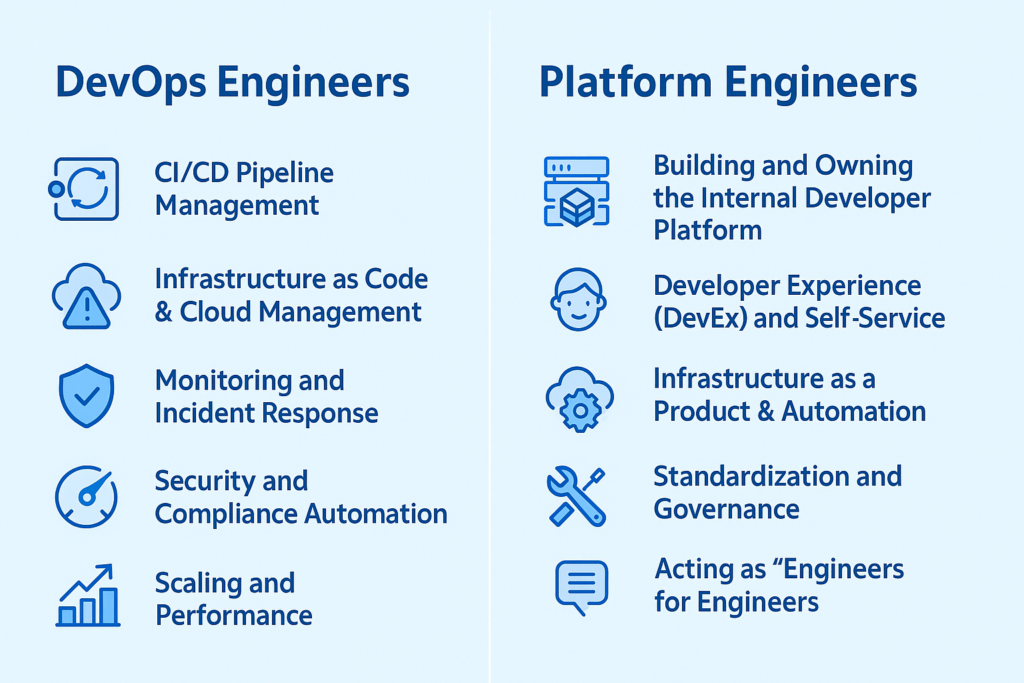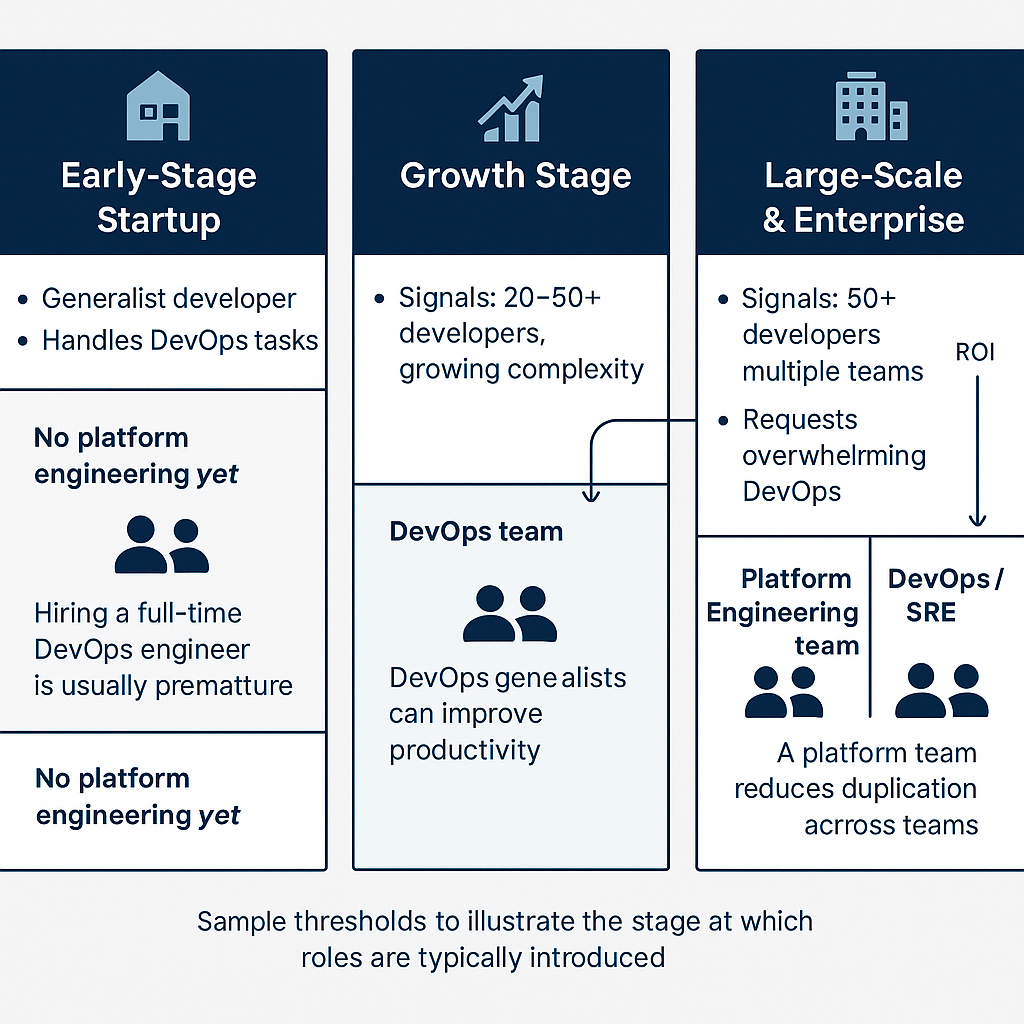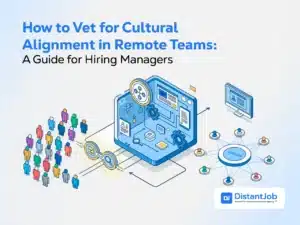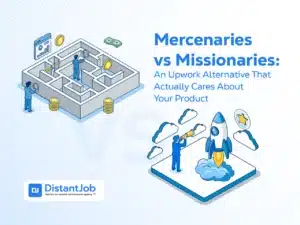As your company grows, you may wonder whether to hire for Platform Engineering and DevOps roles to support your engineering teams. They are often confused by people because platform engineering is an evolution of DevOps principles.
Many companies lack clear definitions for these roles. These job roles share some overlap but serve different purposes, and the right choice often depends on your company’s size, stage, and goals.
Platform engineering can be seen as a specific DevOps good practice, focusing on building a central, product-like internal platform to empower developers. On the other hand, DevOps is a broader culture and set of practices that can involve every team member. The overlap in skills and goals, as well as a lack of consistent definitions, leads to significant confusion between the two.

In this article, we break down how startups, scale-ups, and enterprises can benefit from each role. We’re going to break down exactly what Platform Engineering and DevOps means, what makes them different, when they’re work well together.
Understanding Platform Engineering vs DevOps
Before diving deeper into use cases and hiring cues, it’s important to clearly define what DevOps Engineers and Platform Engineers do, and how their focus areas differ.

DevOps Engineers
DevOps Engineers exist to enable and drive DevOps culture, being primarily responsible for building the platform and necessary automations. However, they are a focal point for transformation. Practicing DevOps is everyone’s responsibility in the organization, including Platform Engineers.
DevOps isn’t a role; it’s a set of good practices for optimizing the SDLC through automation, collaboration, and silo breaking. While responsibilities vary, a DevOps Engineer is an “IT generalist” who bridges the gap between Development (Dev) and Operations (Ops), focusing on automation, infrastructure, and continuous improvement.
DevOps Engineers Responsibilities
DevOps Engineer is a role that comes from the DevOps movement; an approach that started with the collaboration between software Development and IT Ops (operations) to deliver software faster and more reliably. A DevOps Engineer’s mission is to bridge the gap between developers and system administrators, automating and streamlining the path from code to production. Typical responsibilities include:
CI/CD Pipeline Management
Building and maintaining Continuous Integration/Continuous Deployment pipelines. Automation allows test and deploy rapidly and consistently, so developers can ship updates with confidence.
Infrastructure as Code & Cloud Management
Managing cloud infrastructure through code and automation. A DevOps Engineer ensures the underlying infrastructure is properly set up, scalable, and resilient on cloud platforms like AWS, Azure, GCP, etc. They handle provisioning of resources, container orchestration, configuration management, and so on. No wonder DevOps engineers are often confused with Cloud Engineers.
Monitoring and Incident Response
Setting up monitoring, logging, and alerting systems. DevOps Engineers watch over applications and infrastructure, responding to incidents (e.g., outages, performance issues). They also work to resolve them quickly, ensuring high uptime and reliability for the product. Finally, a DevOps Engineer often put in place incident response processes and on-call rotations to manage operational issues.
Security and Compliance Automation
They implement security best practices (access control, secret management, vulnerability scanning) and ensure the infrastructure meets compliance requirements (like SOC 2, HIPAA, GDPR in regulated industries). In some companies, this role may be labeled DevSecOps, wherever there is heavy emphasis on security integration.
Scaling and Performance
Planning for growth by making sure systems can scale easily. A DevOps Engineer designs infrastructure and tooling that handle increasing load, whether through horizontal scaling (more instances/containers) or vertical scaling. They also optimize performance and resource usage to keep systems efficient.
Platform Engineers
Platform engineering is a DevOps good practice, aiming to build and maintain an internal developer platform (IDP) with self-service tools to improve developer experience and reduce cognitive load. Therefore, platform engineers create a custom software platform with all the tools your developers will need to develop: IDEs, code templates, test environments, IaC, orchestration tools, etc..
Think about Batman and his utility belt. The utility belt was supposed to include everything needed for Batman to do his job. Platform engineering is to build a “utility platform” for every developer in your company.
Platform Engineer Responsibilities
Platform Engineering is a newer discipline that builds upon DevOps principles but takes a product-oriented approach to infrastructure and developer tools. Platform Engineers treat the internal developer platform as their product. They create a self-service layer (IDP) that abstracts away infrastructure complexity and provides developers with easy-to-use tools and environments. Typical responsibilities and focus areas for a Platform Engineer include:
Building and Owning the Internal Developer Platform
This is the essence of Platform Engineering role: design, build, and maintain the IDP that developers use daily: Developer portals, templates, custom CLIs, Kubernetes-based environment platforms, CI/CD as a service, shared tooling, etc..
Developer Experience (DevEx) and Self-Service
A core focus of platform engineering is improving developer experience. The goal is to offer developers the “Golden Path”: a workflows that make it easy for devs to do the right thing (deploying apps, creating new services, provisioning resources) without the need to think too much. In short, Platform Engineers create tools as Lego blocks, so developers can build software without cognitive load, stress or infra expertise.
Infrastructure as a Product & Automation
Platform Engineers treat internal infrastructure and tooling as a product to be managed over time. They gather requirements from developer users, build features (like new automation or a service catalog), and iterate just like an external product team would. They also implement advanced automation scripts and “everything-as-code” philosophies (Infrastructure as Code, policy as code, etc.). Therefore, they ensure that common tasks are automated and scalable.
Standardization and Governance
Platform teams centralize tools and services, and they also enforce standards across the company. The platform provides a curated set of technologies (programming languages, deployment methods, cloud services) that are supported and integrated. Security and compliance requirements are baked into the platform (e.g., security scans or access controls are applied uniformly whenever developers use the platform to create resources). It also means fewer one-off solutions; multiple teams share the same platform instead of each inventing their own scripts, which reduces duplication and errors.
Acting as “Engineers for Engineers”
A platform engineer develops software for other developers; the other dev teams are their customers. They often have a strong software engineering background, which they apply to building internal tools and APIs. Additionally, platform engineers work closely with development teams to understand pain points and then create solutions for those (for example, if developers struggle with setting up test data, a platform team might provide a managed test data service).
Notice that Platform Engineers do not typically handle day-to-day production; that remains the realm of DevOps/SRE. Instead, platform engineering is about minimizing problems and incidents.
What is the Difference between Platform Engineering and DevOps Roles?
The difference between a DevOps Engineer and a platform engineer is that DevOps engineers focus on collaboration, rapid delivery, and operational efficiency across the software lifecycle. They ensure features reach end users reliably. Platform Engineers, by contrast, treat internal teams as their customers, building self-service platforms that reduce operational burdens and standardize processes.
While DevOps emerges early to establish agile and reliable release cycles, Platform Engineering typically appears later, creating long-term, product-like solutions that enable scalability and developer autonomy.
Together, they evolve from hands-on, project-based operations toward a product-oriented ecosystem where reliability, automation, and internal developer experience drive sustainable growth. The following table summarizes the difference between Platform Engineering and DevOps:
| Category | DevOps Engineer | Platform Engineer |
| Primary Focus | Collaborative culture and operational practice. | Internal product/service offering. |
| Mindset | Project-based (immediate needs, features, uptime). | Product-based (long-term solutions, roadmaps). |
| Scope | Broad across the entire software lifecycle. | Narrow focus on building the supporting platform. |
| Value | External value (features to end-users) | Internal value (capabilities for developers) |
| Interaction | Works with dev teams on production features/fixes. | Treats dev teams as customers (gathering needs, training). |
| Operational Role | Front-line Ops (monitoring, incident response, troubleshooting). | Reduces Ops burden by building self-service systems. |
| Time of Appearance | Early in the company (initial foundation). | Later, to standardize and scale complexity. |
Who Should You Hire Based on Your Company Size and Needs?
The stage of your company influences whether a DevOps or Platform Engineer is more appropriate (and when to introduce each). If your company is just starting up, your team needs a team with fewer members that can perform many roles (as DevOps). If your company is in growth mode, then you would benefit from hiring DevOps engineers to establish a DevOps culture. And when you are scaling up in an enterprise-scale environment, your teams will benefit from a team of Platform Engineers. Here is a stage-by-stage breakdown:

Early-Stage Startup (Small Team)
In the earliest stage (e.g., a startup with just a handful of developers), you likely do not need a full-time Platform Engineer or even a dedicated DevOps Engineer. Startups or very small teams benefit more from versatile engineers who can wear multiple hats, including basic “DevOps” tasks, rather than specialized roles. A senior software developer takes on cloud and infrastructure duties.
In a small team (around 1–5 engineers), this approach is enough for provisioning cloud resources and managing simple infrastructure needs. The focus at this stage is speed of development and getting the product to market, so any DevOps work (setting up CI/CD, monitoring, etc.) is handled as part of general engineering work.
Hiring a full-time DevOps specialist too early can be overkill unless your product is particularly infrastructure-heavy. Platform Engineering at this stage is unnecessary; there aren’t enough developers or complex workflows to justify building an internal developer platform.
Growth Stage (Scale-Up Company)
As the company grows (for example, moving into tens of developers and multiple engineering teams), the operational complexity increases. When you have on the order of 20–50 engineers or multiple dev teams, it’s usually time to bring in a DevOps Engineer (or a full DevOps team). DevOps generalists will manage infrastructure and deployment challenges more systematically for your growth stage.
At this scale, relying on each development team to manually handle cloud changes or deployment setup becomes inefficient and error-prone. A dedicated DevOps Engineer focuses on automating deployments, improving build pipelines, and maintaining environments so that developers stay productive.
However, if you notice your DevOps team getting swamped with requests or developers waiting on infrastructure, it might be a signal to begin investing in platform capabilities. Hire a Platform Engineer or form a small platform team to create internal tooling and standards. This is why many scale-ups still get by with a strong DevOps team and maybe some infrastructure or tooling engineers.
That being said, a full-fledged Platform Engineering function typically becomes key a bit later when the company is larger. The key is to monitor pain points: if setting up new services or environments is slow and causing developer frustration, introducing platform practices (self-service tools, standardized environments) can significantly help even in this stage.
Large-Scale & Enterprise
In a large company or enterprise (with dozens of teams or 50+ developers), the needs become broad enough that both DevOps and Platform Engineering roles usually have a place. Enterprises often implement DevOps practices across teams and maintain a dedicated Platform Engineering team to provide a robust internal developer platform.
In fact, as companies scale, they require structured, consistent platforms rather than relying solely on DevOps support. Here, the Platform Engineering team builds and maintains the common tooling (CI/CD systems, Kubernetes platforms, developer portals, etc.) that all dev teams use, while DevOps Engineers (or site reliability engineers) focus on operating and automating the infrastructure within those frameworks.
At the enterprise stage, it’s common to have multiple DevOps Engineers working in various product teams or infrastructure teams, plus a Platform Engineering team owning an internal platform. For example, a big company might have a Platform Product Manager guiding the platform roadmap and coordinating between platform engineers and development teams.
The Platform team’s work ensures that development teams can self-service most infrastructure needs through well-defined interfaces, reducing cognitive load and duplication. Meanwhile, DevOps (or SRE) roles continue to ensure reliability and handle any custom needs or legacy systems not covered by the platform.
Platform Engineering vs DevOps at Company Size Comparison Table
Early startups rely on developers to handle basic DevOps for speed and simplicity. As companies scale to multiple teams, hiring DevOps Engineers becomes essential to automate pipelines and manage deployments. When growth causes infrastructure bottlenecks, Platform Engineers emerge to create self-service tools and standardize practices. In large companies, both Platform and DevOps teams coexist: Platform Engineers build shared systems like CI/CD or Kubernetes, while DevOps or SREs focus on maintaining reliability and ensuring smooth operations across all development teams.
| Company Stage/Size | Engineering Team Size (Approx.) | Primary Need/Focus | Recommended Role to Hire | Explanation |
| Early-Stage Startup | 1–5 engineers (handful of developers) | Speed of development and getting the product to market. | No dedicated role necessary; senior software developers handle basic “DevOps” tasks. | Focus is on speed; specialized roles are overkill unless the product is infra-heavy. Platform Engineering is unnecessary due to low complexity. |
| Growth Stage (Scale-Up Company) | 20–50 engineers (multiple teams) | Systematic management of increasing operational complexity and deployment challenges. | A DevOps Engineer (or full DevOps team) is usually the first hire. | Dedicated DevOps generalists improve build pipelines, automate deployments, and maintain environments for developer productivity. |
| Growth Stage (Scaling Pain Points) | 20–50 engineers (multiple teams) | The DevOps team is swamped, or developers are waiting on infrastructure. | Begin investing in platform capabilities (a Platform Engineer or small team). | The pain points signal a need to codify best practices into internal tooling and standards (self-service tools) to reduce frustration and slow setups. |
| Large-Scale & Enterprise | 50+ developers (dozens of teams) | Structured, consistent platform and reliable operations across the organization. | Platform Engineering Team AND DevOps Engineers (or SREs). | Enterprises require a dedicated Platform team to build and maintain common tooling (CI/CD, Kubernetes) for all teams, while DevOps/SREs operate within those frameworks and ensure reliability. |
Platform Engineering vs DevOps Salaries
According to Platform Engineering’s survey with 450 respondents, the annual salary difference between Platform Engineers and DevOps Engineers in North America is huge. Platform Engineers earn an average of $193,412, while DevOps Engineers earn an average of $152,710. This difference represents a bonus of +26.6% for Platform Engineers.
European Salary Comparison
The salary trend favoring platform engineers is consistent in Europe, although the overall figures are significantly lower:
- European Platform Engineers earn an average of $118,028.
- European DevOps roles earn an average of $96,132.
This gap is approximately 22.78% in favor of Platform Engineers. However, anecdotal evidence from Reddit points to much lower pay in certain European regions; for example, a Cloud DevOps role in Italy with one year of experience reported a salary of $32,000 per year, with similar pay in Estonia.
| Metric | Platform Engineer | DevOps Engineer | Platform Engineer vs. DevOps Difference |
| North America Average Salary | $193,412 | $152,710 | +$40,702 or +26.6% |
| Europe Average Salary | $118,028 | $96,132 | +$21,896 or +22.78% |
| Salary Trend | Higher in both regions. | Lower in both regions. | Platform Engineers consistently earn more in both regions. |
Conclusion
Choosing between hiring a DevOps Engineer or a Platform Engineer (or deciding when to evolve from one to the other) comes down to understanding your company’s current needs and future trajectory.
In summary, DevOps Engineers excel at quickly bringing rigor and automation to your software delivery process; they are indispensable for getting startups and growing teams onto a solid operational footing. Platform Engineers become critical as your company scales, ensuring that the efficiency and speed of development don’t degrade as more teams and services enter the picture.
And if you ever need to hire a DevOps Engineer or a Platform Engineer, contact us. You will find the best unicorn of the world, tailored to your needs, at a much lower expense than in the American market!





